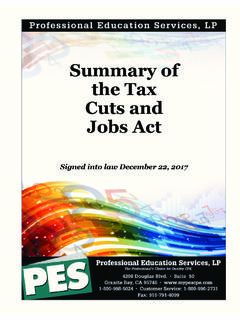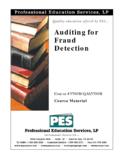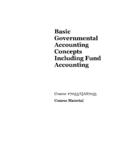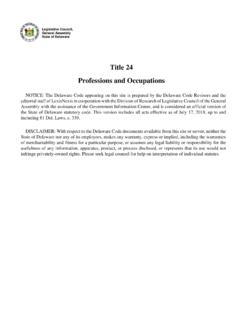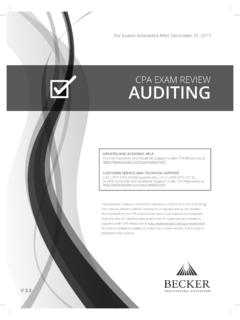Transcription of Tax-Basis Financial Statements
1 Tax-Basis Financial Statements #7345 ACOURSE MATERIALT able of Contents iTABLE OF CONTENTSTAX- basis Financial Statements 1A. Definition of Special Purpose Framework and Tax basis 1B. New Definition of Tax-Basis Financial Statements 2C. When to Use and Not Use Tax-Basis Financial Statements 5D. Present Reporting and Disclosure Authority- Tax basis 7E. Items Peculiar to Tax-Basis Financial Statements 7F. Disclosure and Financial Statement Requirements- Tax basis 9G. Making Tax-Basis Financial Statements Simpler to Use and Understand 10H. Converting to Tax-Basis Financial Statements 39I. Cash Flows Statement 42J. Tax-Basis Financial Statement Titles 42K. Disclosure and Financial Statement Requirements- Tax basis 44L. Authority for Tax-Basis Disclosures 46M. Disclosures of Fair Value- Tax basis 50N. Miscellaneous Disclosures- Tax basis 52O. Other Tax-Basis Issues 52P.
2 Using Tax basis Based on a Method That Differs From the Income Tax Return 52Q. Combining Financial Statements Prepared in Accordance With the Tax basis of Accounting 58R. Disregarded Entities and Tax-Basis Financial Statements 59S. Tax basis and the Uses To File Criterion 61T. Tax-Basis Financial Statements - State Tax basis of Accounting 62U. Section 179 Depreciation- Tax basis 62V. Presenting Section 179 and Bonus Depreciation on the Tax-Basis Income Statement 65W. Agreements Not to Compete- Tax-Basis Financial Statements 68X. Presenting Insolvency in Tax-Basis Financial Statements 70 Test Your Knowledge 73 Solutions and Suggested Responses 77 Glossary 81 Index 83 ii Table of ContentsNOTICEThis course and test have been adapted from supplemental material and uses the materials entitled Tax-Basis Financial Statements and is a component of Everything You Never Wanted to Know About GAAP 2016 by Steven C.
3 Fustolo, CPA. Displayed by permission of the author. All rights of these materials or services provided by Professional Education Services, LP ( PES ) is governed by the Terms and Conditions on PES website ( ). PES provides this course with the understanding that it is not providing any accounting, legal, or other professional advice and assumes no liability whatsoever in connection with its use. PES has used diligent efforts to provide quality information and material to its customers, but does not warrant or guarantee the accuracy, timeliness, completeness, or currency of the information contained herein. Ultimately, the responsibility to comply with applicable legal requirements falls solely on the individual licensee, not PES. PES encourages you to contact your state Board or licensing agency for the latest information and to confirm or clarify any questions or concerns you have regarding your duties or obligations as a licensed professional.
4 Professional Education Services, LP 2016 Program Publication Date 9/13/2016 Tax-Basis Financial Statements 1 Tax-Basis Financial STATEMENTSC ourse ObjectivesAfter completing this course, you should be able to: Recognize some of the M-1 differences that do not apply to Tax-Basis Financial Statements . Recognize how to account for an accounting change in Tax-Basis Financial Statements . Recall how to account for and present nontaxable and nondeductible items in Tax-Basis Financial Statements . Identify the disclosure requirements for Tax-Basis Financial Statements . Recognize the appropriate and inappropriate Financial statement titles for Tax-Basis Financial the wave of complexity that has affected the accounting profession over the past decade, using tax-basis1 Financial Statements has become increasingly popular with nonpublic than ever, major differences now exist between GAAP and taxable income due to two factors.
5 First, there has been a continued upheaval in the tax code since the mid-1980s. Second, the FASB has issued numerous GAAP Statements in the post-Enron period. As a result, small business owners find a continued conflict between balancing a desired lower taxable income for tax planning with higher Financial statement income necessary to appease the bank or third party investor. In certain cases, Tax-Basis Statements act to bridge this gap so that tax and Financial income are more congruous. A. DEFINITION OF SPECIAL PURPOSE FRAMEWORK AND TAX basis Before the author continues in this section, the term income tax basis is a term that was in effect prior to 2012. From 2012, that term is replaced with the new term tax basis based on newly issued auditing, compilation and review enough, the rules for non-GAAP frameworks, such as income tax basis , have existed within auditing literature since inception.
6 SAS No. 62, Special Reports, originally introduced the concept of other comprehensive basis of accounting (OCBOA), a term that has included income tax basis , cash/modified cash basis , and regulatory basis of accounting. Parallel guidance was included with the 2012, the Auditing Standards Board (ASB) reissued all auditing standards under its Clarity Project. In doing so, the ASB issued SAS Nos. 122-126, which was subsequently supplemented by SAS Nos. 127 and The previous term income tax basis is superseded by the term tax basis under new auditing, compilation, and review standards. 2 Tax-Basis Financial StatementsAs part of the reissuance of the SASs, the guidance found in SAS No. 62, Special Reports, was superseded by new AU-C 800: Special Considerations- Audits of Financial Statements Prepared in Accordance with Special Purpose Frameworks.
7 AU-C 800 introduces a new term special purpose framework, which encompasses non-GAAP frameworks used to issue Financial Statements . In essence, the special purpose framework concept replaces other comprehensive basis of accounting (OCBOA) that has been used to define non-GAAP frameworks such as income Tax-Basis Financial Statements . One key change made is that the term income tax basis is replaced with the term tax basis . In October 2014, the AICPA s Accounting and Review Services Committee (ARSC) completed its own Clarity Project to recodify the compilation and review standards, by issuing SSARS No. 21, Statements on Standards for Accounting and Review Services: Clarification and Recodification. SSARS No. 21 supersedes all compilation and review standards found in SSARS No. 19 and other SSARSs (except one) and is effective for years ending on or after December 15, 2015.
8 Early application is No. 21 encompasses new standards for compilation and review engagements, and introduces a newly authorized preparation of Financial Statements engagement found in AR-C Section 70 of SSARS No. key change made by SSARS No. 21 is that it carries over the new definition of special purpose framework (and the new tax basis term) found in auditing standards within AU-C , after the effective dates of AU-C 800 (auditing standards) and SSARS No. 21 (compilation and review standards), there is a new set of rules that apply to Tax-Basis Financial Statements under the concept of a special purpose framework. Those rules and definitions are consistent across the board for auditing, review and compilation engagements, as well as the newly authorized preparation of Financial Statements NEW DEFINITION OF Tax-Basis Financial STATEMENTSAU-C 800 (auditing standards) and SSARS No.
9 21 (compilation and review standards), introduce the new term special purpose framework to encompass certain non-GAAP 800 and SSARS No. 21 define a special purpose framework as a Financial reporting framework other than GAAP that is one of the following bases of accounting: Cash basis : A basis of accounting that the entity uses to record cash receipts and disbursements and modifications of the cash basis having substantial support (for example, recording depreciation on fixed assets). Tax basis : A basis of accounting that the entity uses to file its income tax return for the period covered by the Financial Statements . Tax basis can include cash basis , accrual basis , or any method that clearly reflects income under Section 446 of the Internal Revenue Financial Statements 3 Regulatory basis : A basis of accounting that the entity uses to comply with the requirements or Financial reporting provisions of a regulatory agency to whose jurisdiction the entity is subject (for example, a basis of accounting that insurance companies use pursuant to the accounting practices prescribed or permitted by a state insurance commission.)
10 Contractual basis : A basis of accounting that the entity uses to comply with an agreement between the entity and one or more third parties other than the auditor. Other basis : A basis of accounting that uses a definite set of logical, reasonable criteria that is applied to all material items appearing in Financial Statements . The cash, tax, regulatory and other bases of accounting have been commonly referred to as other comprehensive bases of accounting, although the term OCBOA is no longer included in any of the standards. The following table compares the new definition of special purpose framework to the version of OCBOA previously found in old SAS No. 62, Special Definition Special Purpose Framework AU-C 800 and SSARS No. 21 Previous Definition Other Comprehensive basis of Accounting (OCBOA) (SAS No. 62, AU 523)DefinitionSpecial Purpose FrameworkOther Comprehensive basis of Accounting (OCBOA)Cash basisA basis of accounting that the entity uses to record cash receipts and disbursements and modifications of the cash basis having substantial supportThe cash receipts and disbursements basis of accounting, and modifications of the cash basis having substantial supportTax basis (Income tax basis )Tax basis : A basis of accounting that the entity uses to file its income tax return for the period covered by the Financial statementsIncome tax basis : A basis of accounting that the reporting entity uses or expects to use to file its income tax return for the period covered by the Financial Statements 4 Tax-Basis Financial StatementsNew Definition Special Purpose Framework AU-C 800 and SSARS No.

